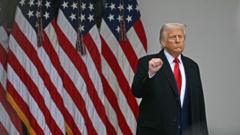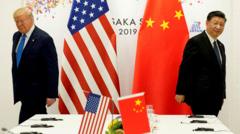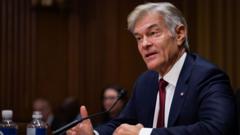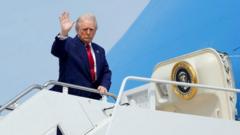The implementation of tariffs and recent electoral outcomes highlight a pivotal moment for Trump’s agenda, raising concerns about economic repercussions and internal party dissent.
Trump's Tariff Strategy Faces Backlash Amid Financial Turmoil and Political Setbacks

Trump's Tariff Strategy Faces Backlash Amid Financial Turmoil and Political Setbacks
Trump's latest tariff announcement aims to reshape the U.S. economy, but financial markets and political dynamics warn of potential challenges ahead.
Donald Trump's declaration of April 2 as America's "liberation day" following his announcement of new tariffs on U.S. imports has raised eyebrows as the U.S. stock market reacts negatively, signaling a clash between his ambitions and economic realities. Since his tariff announcement, the markets have experienced significant downturns, with trading partners like Canada, the European Union, and China indicating they are prepared to retaliate aggressively.
Despite this turmoil, Trump remains steadfast in his vision of revitalizing American manufacturing by shielding it from international competition. As stock futures plunge, the atmosphere at the White House is tense, with security preparations visibly increasing for upcoming protests in Washington. The first lady has canceled a garden tour due to security threats, further underscoring the precarious state of Trump's administration.
Speaking briefly to the media, Trump expressed confidence in the long-term success of his economic plans, assuring that America’s fortunes would eventually shift for the better. Yet, the turbulence extends beyond trade; Trump's two main foreign policy initiatives—resolving conflicts in Gaza and Ukraine—are also grappling with complex, evolving obstacles. The ongoing conflict in Gaza has escalated once more, with renewed military action eroding any semblance of the ceasefire previously promoted by the Trump administration.
In Ukraine, negotiations with Russia seem to falter, with Trump voicing concerns over Russia's tactics while still believing in the potential for a diplomatic resolution. Critics, including former Biden administration official Jake Sullivan, argue that Trump has inadvertently been yielding to Moscow's demands rather than catalyzing serious negotiations.
Moreover, Trump's immigration policies, which usually garner substantial public approval, also find themselves challenged amid legal hurdles. As deportation efforts face judicial scrutiny, multiple court cases regarding Trump's immigration directives are in progress, with future Supreme Court intervention anticipated.
The political landscape proves equally tumultuous, as recent elections have showcased the electorate's possible shift away from Trump’s expected dominance. Democratic victories in key races point to an invigorated opposition that could undermine Republican strongholds as the midterm elections draw closer.
Rising dissent within Republican ranks is becoming evident, with notable figures like Ted Cruz expressing concerns that tariffs might harm American jobs. Meanwhile, four Republican senators recently joined Democrats to challenge Trump's tariff policies, indicating growing unease within the party. With economic distress looming, Republicans may begin to reassess their allegiance to Trump, raising questions about the viability of his ambitious agenda moving forward.
As the that is the situation unfolds, Trump, while outwardly untroubled, will need to navigate and reconcile the stark realities that could undermine his legacy of transformation.






















